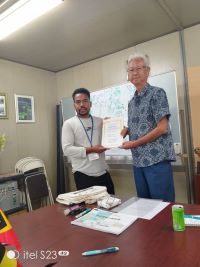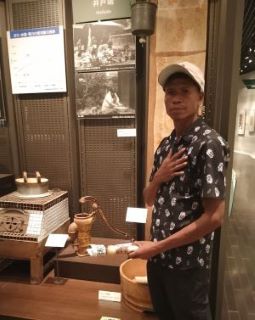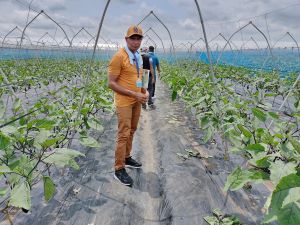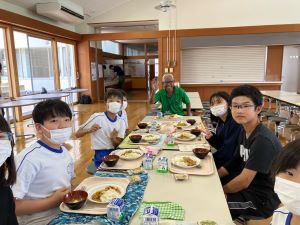Four Timorese Farmers Took Agriculture and Poultry Training in Japan
2024.08.27

From 23rd of June to 2nd of July, a Japanese company, Donkame, implementing JICA’s grassroots project in Viqueque, organized an intensive training for agriculture and poultry in Japan for four Timorese. The participants are leaders of agricultural cooperatives from 4 areas in Viqueque municipality.
In the training, participants learnt how to cultivate and manage popular vegetables such as tomatoes and eggplants and about compost making for circularted agriculture. In this project, it is expected to increase income through agriculture and poultry, the groups have already made a profit from the harvest.
The participants also visited road stations where locals sell products, and experienced school lunch that uses local materials, learnt the utilization of local ingredients. Additionally, they talked on the radio and joined an open theatre for Timorese movie. The training was a good opportunity to deepen mutual understanding between countries as well.











Mr. Jose Fereira Pinto
Leader of Kamnasatehen agriculture group, Viqueque

I am grateful to have an opportunity to participate in this training in Japan.
In Timor-Leste, I studied agriculture at an agricultural school and wanted to set upcreate cooperative, liven up the local area through agriculture.
After I graduated the school, I returned to my hometown and organized a new group. But since I didn’t have any experience, itI was a working through try and error because I didn’t have any experience. At that time, a village agriculture extension worker recommended me to join the Donkame project as a good opportunity.
I have learnt basic agricultural knowledge and cultivation techniques at a deeper level from the Donkame Project team through the training in Japan and in Viqueque.
During the training in Japan, I had the opportunity to visit farmers' fields and experience practical training on the cultivation management of various vegetables such as tomatoes and eggplants.
I learned the importance of precise cultivation management for growing healthy and large vegetables and for increasing yields. Through the training, I was particularly interested in collecting sweet potato seedlings and making compost.
We made a seedbed to grow sweet potato vines, then planted them as seedlings. I learned for the first time that compost can be produced by building a compost frame, putting organic waste such as grass and leaves into it as raw materials, turning it over once a month, and turning it over three times.
I was also taught that compost is important for creating a circular flow that "things from the field should return to the field."
In the future, I would like to spread Japanese agricultural techniques to the local people, not only to my group. I would also like to grow and sell many vegetables for a better life through agriculture.
Mr. Martins Gomes
Leader of Habras agriculture group, Lacluta

I am grateful to an opportunity to participate in this training in Japan.
Laclta city where I live receives barely support from other countries due to its location.
Even under such conditions, I am truly grateful that Donkame and the project team selected us as the agricultural target site for the JICA Grassroots Technical Cooperation Project.
Our group mainly cultivate corn, and for vegetables we simply throw seeds and harvest them when the time comes, we were barely able to produce enough for ourselves.
Through the project, we learned basic knowledge and techniques of vegetable cultivation from Donkame on site, and just as we were gradually becoming able to sell vegetables, we had the opportunity to participate in the training in Japan.
Through the field training at the organic farm "Sousai Farm", we learned deeply the techniques what to pay attention to grow big and healthy vegetables. I strongly felt that proper cultivation and management of vegetables increasing yields.
Also, when I talked with farmers in Japan, I learned that the farmers in Japan not only “farming” vaguely as a job but also collecting various information daily and trying new things every year with passion to seek the points to improve.
In addition to cultivation training, I would like to try many other things that I have not tried yet, such as poultry and compost making, which I learned about during this training.
In the future, I would like to increase the cultivation field and grow a variety of vegetables. I would like to manage vegetable properly, increase yields and sell more vegetables, which will lead to improved livelihoods for each member of the group.
Mr. Anibal Do Rosario Amaral
Leader of Dentri family agriculture group, Uatolari

I am grateful to the opportunity to participate in the training in Japan.
Even with support from other organizations, it was often not effective with only funding and distribution of supplies, but through the JICA project, I learned agricultural and poultry farming knowledge and techniques directly from Donkame, and I participated in the training I began to see results little by little.
During the training in Japan, I experienced basic agricultural knowledge and techniques, as well as various initiative of Japanese people.
I attended lectures using agriculture textbooks and practiced the cultivation management of various vegetables such as tomatoes, eggplants, cucumbers, and pumpkins at an organic farm, and was able to gain a deeper understanding of what I need to pay attention.
In Haga Town, Tochigi Prefecture where I stayed, local farmers supplied vegetables to school lunches. I ate school lunches with the students and joined exchange event, I was quite impressed with it.
In my hometown, we are asked to provide vegetables and eggs for school lunches. We believe that school lunches are important to improve the nutrition of local children. We want to grow more vegetables, increasing the number of chickens, and produce lots of eggs in order to meet those expectations.
We also had the opportunity to learn about Japanese history and culture. It was particularly interesting because the Japanese military stayed in Timor-Leste during World War II.
In the future, we want our group to become a model for the area, and to become a training center where students and local people can learn agricultural knowledge and skills. I want to contribute to the future that more young people will be interested in agriculture, earning a living from it, and can live without going to the capital or overseas.
Mr. Agusto da Silva
Secretary of Hanari agriculture group, Uatu-carbau

I am grateful to participate in the training in Japan.
I experienced and learned a lot through this training, including basic knowledge of agriculture, vegetable cultivation management techniques, poultry farming, and making and utilizing compost.
For basic agriculture knowledge, we read aloud from a textbook on vegetable cultivation, confirming the key points for sowing, raising seedlings, and transplanting, as well as the key points for cultivating each vegetable and the points to be careful about when cultivating and managing it.
For vegetable cultivation management techniques, we learned the cultivation management work of each vegetable kind practically in the fields of an organic farmer. Planting, staking, training, and thinning tomato seedlings, setting up supports and training eggplants and peppers. There were also management tasks that I did for the first time, such as topping cucumbers, pollinating pumpkins, and picking and planting sweet potato seedlings. During the practical training, the farmers explained the meaning of the work and the points to be careful, and I was able to understand it.
Regarding poultry farming, I learned about Japanese-style free-range poultry farming from a textbook such as chicken ecology, how to raise them in the chicken coop, egg collection, feeding, disease prevention, etc. I also had the opportunity to experience to make fermented feed. I heard that in Japan, a lot of food waste is produced, utilizing it to transform to compost.
Regarding compost making and usage, I learnt how to make a compost frame and what becomes the raw material for compost, turning work, and the fertilization method of base fertilizer and topdressing. In my area, there is a lot of organic matter such as grass, fallen leaves, cow dung, etc, that can be used as compost, but I have never used before. I would like to try it out and use it in the fields and see how it affects the vegetable growth.
I would like to properly share the various things I learned in this training with the members and utilize it. Also, I would like to sell a lot of the group's agricultural products in the local area to enrich our lives.
scroll